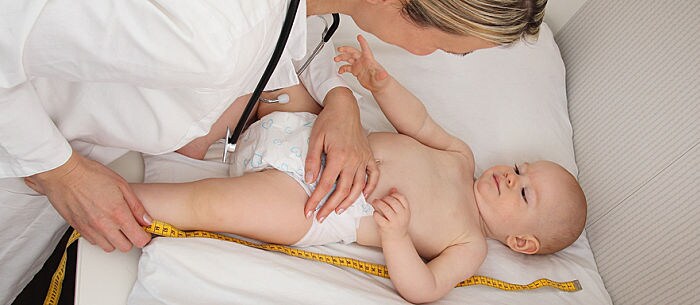When you first brought him home, he was tiny. It’s hard to imagine the man he will someday become. Though it’s difficult to notice significant changes in growth on a day-to-day basis, your son is constantly changing. Which you can probably tell by how much he’s eating!
A quick glance at that ever-growing pile of baby clothes he has outgrown will show you just how quickly your baby is racing towards toddlerhood, childhood and into those awkward teen years — and may lead to the question: When do boys stop growing? With every outgrown onesie, too-snug sleeper and never-gonna-fit-again pair of shoes you go through, you may wonder if you will ever keep your child in clothes that fit! Here’s what experts say you can expect in your growing boy.
When Do Boys Stop Growing?
“Infants grow so fast and so often in the first year most parents accept this as the norm, but nature plays a trick on us. After the age of two, this quick rate of growth slows down substantially to a turtle-like 2.5 inches (6 cm) per year,” explains Dr. Mark Gettleman, a pediatrician and the founder of Dr. Goofy Gettwell Pediatrics. “This steady state of growth remains until puberty, which starts around age 10 to 15 in boys.” Puberty marks the beginning of numerous bodily changes in children and starts the first of many growth spurts, which will continue through the teen years and into early adulthood.
“The growth pattern seen in young boys is much more variable than that of girls. Boys tend to start and stop — they may grow heavily for a year and then take a break for a while. Their growth is really sporadic,” says Dr. Natasha Burgert, a general pediatrician and the founder of KC Kids Doc. “Male growth spurts and puberty is, in part, driven by genetics. Boys are likely to hit their growth spurts in a similar pattern that their father did.”
Essentially, if Dad was a late bloomer, his son may also follow that pattern. If Dad was topping out at 6 feet by the end of middle school, you can expect your child to hit his major growth spurts earlier as well. The increase in testosterone responsible for triggering growth causes other noticeable changes as well, including enlarged testicles and penis growth, growth of pubic and body hair and changing and deepening of the voice.
At what age do boys stop growing? The stopping date for male growth is just as variable as the starting date. Some men are done growing around the end of high school, while others continue into the college years. “Puberty generally lasts two to five years, stopping around ages 17 to 19 for boys. At the end of puberty, the growth plates on the long bones close, which ends the normal period of growth,” says Dr. Gettleman.
What to Expect During Puberty
In addition to making frequent trips to the store for new clothes, you can expect to notice some behavioral changes in your son as he goes through puberty. “Your child may experience growing pains, especially if you did as a child,” explains Dr. Burgert. “Kids who are more athletic may experience more pain as they are putting more strain on their bones through strenuous activity.”
You may notice it’s nearly impossible to roll your child out of bed on the weekends, and this, too, is to be expected. “Sleep and listlessness skyrocket during growth phases and are the norm — your growing child needs more sleep,” notes Dr. Gettleman. Also associated with puberty are increased mood swings, clumsiness and a seemingly bottomless pit of a stomach. Your child will need plenty of extra calories to accommodate the growth his body is doing.
Remember, young boys have a particularly variable growth pattern, so don’t stress out if your child seems ahead of or behind the growth curve of others his age. “Your child’s height percentile doesn’t matter, just so long as they are staying on the same growth curve,” reminds Dr. Burgert. “If you have concerns about stunted growth or growth disorders, talk to your pediatrician early to see if intervention is needed.” Also, don’t compare males to their female peers, as boys hit their growth spurts a couple years later than girls on average.
Victoria Georgoff is a freelance writer and psychotherapist who enjoys writing about parenting, helping other parents and, of course, being a parent herself.
